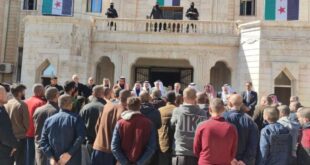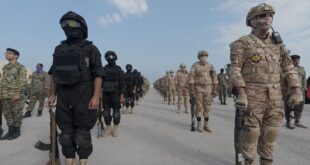‘Week may decide fate of Iraq’
BAGHDAD, June 23, (Agencies): The fate of Iraq may be decided over the next week, the top US diplomat said Monday, and largely depends on whether its leaders keep their commitment to meet looming deadlines to seat a new government before a Sunni insurgency sweeps away hopes for lasting peace.
It was a dire message to leaders of Iraq’s bitterly divided Shiite, Sunni and Kurdish political coalitions who have lived through more than three decades of dictatorship, sanctions and wars. And it sought to hold the officials to a government transition that the US believes will stave off the threat of a new civil war by giving more power to Iraq’s minorities.
“This is a critical moment for Iraq’s future,” US Secretary of State John Kerry said at a press conference in Baghdad. “It is a moment of decision for Iraq’s leaders and it’s a moment of great urgency.” Kerry offered few details of his closed-door meetings in Baghdad. But he said each of the officials he met with — including Shiite Prime Minister Nouri al-Maliki — committed to seat a new parliament by July 1 as the constitution requires. “The very future of Iraq depends on choices that will be made in the next days and weeks, and the future of Iraq depends primarily on the ability of Iraq’s leaders to come together and take a stand united against ISIL,” Kerry said, referring to the insurgency known as the Islamic State of Iraq and the Levant. “Not next week, not next month, but now.” He also said no country — including the US – should try to pick new leader ship for Iraq. “That is up to the people of Iraq,” Kerry said.
Al-Maliki is facing growing calls for his resignation as disgruntled Sunnis say they do not believe he will give them a greater voice in the government. After suffering together through more than eight years of war – which killed nearly 4,500 American troops and more than 100,000 Iraqis – Washington and Baghdad are trying to shelve mutual wariness to curb the very real prospect of the Mideast nation falling into a fresh bout of sectarian strife. Sunnis frustrated with being cut out of power are increasingly joining the ISIL, a bloody insurgency that has been emboldened by battlefield successes in neighboring Syria’s civil war
Parliament Speaker Osama al-Nujaifi, one of Iraq’s top-ranking Sunnis, told Kerry that the insurgents pose “a threat to the entire world.” Al-Nujaifi, is from Mosul, Iraq’s second largest city which was overrun earlier this month by militants. Of the insurgents, al-Nujaifi said “we have to confront it through direct military operations, political reforms so that we can inject a new hope into our own people so that they can support the political process and the unity of Iraq.” Iraqi officials briefed on Kerry’s talks with the Iraqi prime minister said al- Maliki urged the United States to target the militants’ positions in Iraq and neighboring Syria, citing training camps and convoys with airstrikes.
The officials said Kerry responded by saying a great deal of care and caution must be taken before attacks are launched to avoid civilian casualties that could create the impression that Americans are attacking Sunnis. The officials spoke on condition of anonymity because they were not authorized to speak to the media on the record. President Barack Obama, in a round of television interviews that aired in the US, said al-Maliki and the Iraqi leadership face a test as to whether “they are able to set aside their suspicions, their sectarian preferences for the good of the whole.” “And we don’t know,” Obama said. “The one thing I do know is that if they fail to do that then no amount of military action by the United States can hold that country together.” Kerry arrived in Baghdad just a day after the Sunni militants captured two key border posts, one along the frontier with Jordan and the other with Syria, deepening al-Maliki’s predicament.
Their latest victories considerably expanded territory under the militants’ control just two weeks after the al-Qaeda breakaway group started swallowing up chunks of northern Iraq, heightening pressure on al- Maliki to step aside. The offensive by ISIL takes the group closer to its dream of carving out an Islamic state straddling both Syria and Iraq. Controlling the borders with Syria will help it supply fellow fighters there with weaponry looted from Iraqi warehouses, boosting its ability to battle beleaguered Syrian government forces. On Monday, gunmen ambushed a police convoy transferring prisoners about 85 miles (140 kms) south of Baghdad, killing nine policemen and 13 prisoners, according to police officials. The officials said some of the prisoners, some of whom were convicted of terrorism- related charges, were being taken to a high-security prison in the southern city of Nasiriyah 200 miles (320 kms) southwest of Baghdad. The officials spoke on condition of anonymity because they were not authorized to speak to the media.
The militants’ stunning battlefield successes in the north and the west of Iraq have laid bare the inadequacies of the country’s US-trained forces. In the north, troops fled in the face of advancing militants, abandoning their weapons, vehicles and other equipment. In some cases in the west, they pulled out either when the militants approached or when they heard of other towns falling. Sunday’s capture by the militants of crossings bordering Jordan and Syria followed the fall on Friday and Saturday of the towns of Qaim, Rawah, Anah and Rutba, all of which are in Sunni-dominated Anbar province, where the militants have since January controlled the city of Fallujah and parts of the provincial capital, Ramadi.
Border Kerry met Iraq’s prime minister in Baghdad on Monday to push for more inclusive leadership, as Nuri al-Maliki’s forces abandoned the border with Jordan, leaving the entire Western frontier beyond government control. Sunni tribes took the Turaibil desert border crossing, the only legal crossing point between Iraq and Jordan, after Iraqi security forces fled, Iraqi and Jordanian security sources said. Tribal leaders were negotiating to hand the post to Sunni Islamists from the Islamic State in Iraq and the Levant (ISIL) who took two main crossings with Syria in recent days and have pushed the Shiite-led government’s forces back toward Baghdad. Ethnic Kurdish forces control a third border post with Syria in the north, leaving government troops with no presence along the entire 800-km (500-mile) western frontier which includes some of the most important trade routes in the Middle East.
For the insurgents, capturing the frontier is a dramatic step towards the goal of erasing the modern border altogether and building a caliphate across swathes of message was delivered behind the scenes. There was little small talk when Kerry met Maliki, the two men seated in chairs in a room with other officials. At one point Kerry looked at an Iraqi official and said, “How are you?” The meeting lasted one hour and 40 minutes, after which Kerry was escorted to his car by Iraq’s Foreign Minister Hoshiyar Zebari. As Kerry got in, he said: “That was good.” Iran’s Supreme Leader Ayatollah Ali Khamenei on Sunday accused Washington of trying to regain control of the country it once occupied – a charge Kerry denied. Iraqis are due to form a new government after an election in April.
Maliki’s list won the most seats in parliament but would still require allies to win a majority. Kerry said on Sunday the United States would not choose who rules in Baghdad, but added that Washington had noted the dissatisfaction among Kurds, Sunnis and some Shiites with Maliki’s leadership. He emphasised that the United States wanted Iraqis to “find a leadership that was prepared to be inclusive and share power”. Senior Iraqi politicians, including at least one member of Maliki’s own ruling list, have told Reuters that the message that Washington would be open to Maliki leaving power has been delivered in diplomatic language to Iraqi leaders. Recent meetings between Maliki and American officials have been described as tense. According to a Western diplomat briefed on the conversations by someone attending the meetings, US diplomats have informed Maliki he should accept leaving if he cannot gather a majority in parliament for a third term. US officials have contested that such a message was delivered.
A close ally of Maliki has described him as having grown bitter toward the Americans in recent days over their failure to provide strong military support. Jordanian army sources said Jordan’s troops had been put in a state of alert in recent days along the 181-km (112-mile) border with Iraq, redeploying in some areas as part of steps to ward off “any potential or perceived security threats”. The Jordan border post was in the hands of Sunni tribesmen. An Iraqi tribal figure said there was a chance it would soon be passed to control of the militants, who seized the nearby crossing to Syria on the Damascus-Baghdad highway on Sunday. He said he was mediating with ISIL in a “bid to spare blood and make things safer for the employees of the crossing. We are receiving positive messages from the militants.”
 Eurasia Press & News
Eurasia Press & News



